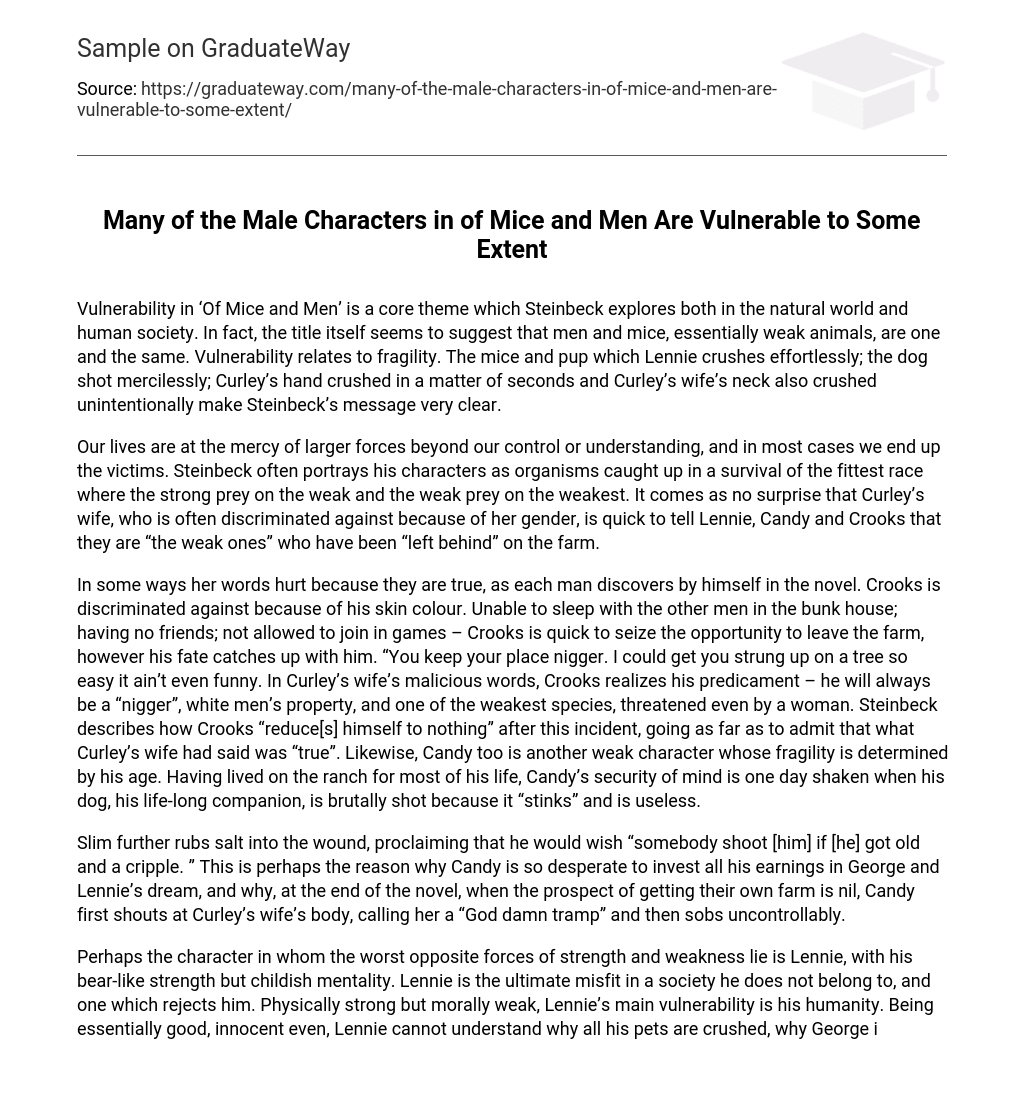Vulnerability in ‘Of Mice and Men’ is a core theme which Steinbeck explores both in the natural world and human society. In fact, the title itself seems to suggest that men and mice, essentially weak animals, are one and the same. Vulnerability relates to fragility. The mice and pup which Lennie crushes effortlessly; the dog shot mercilessly; Curley’s hand crushed in a matter of seconds and Curley’s wife’s neck also crushed unintentionally make Steinbeck’s message very clear.
Our lives are at the mercy of larger forces beyond our control or understanding, and in most cases we end up the victims. Steinbeck often portrays his characters as organisms caught up in a survival of the fittest race where the strong prey on the weak and the weak prey on the weakest. It comes as no surprise that Curley’s wife, who is often discriminated against because of her gender, is quick to tell Lennie, Candy and Crooks that they are “the weak ones” who have been “left behind” on the farm.
In some ways her words hurt because they are true, as each man discovers by himself in the novel. Crooks is discriminated against because of his skin colour. Unable to sleep with the other men in the bunk house; having no friends; not allowed to join in games – Crooks is quick to seize the opportunity to leave the farm, however his fate catches up with him. “You keep your place nigger. I could get you strung up on a tree so easy it ain’t even funny. In Curley’s wife’s malicious words, Crooks realizes his predicament – he will always be a “nigger”, white men’s property, and one of the weakest species, threatened even by a woman. Steinbeck describes how Crooks “reduce[s] himself to nothing” after this incident, going as far as to admit that what Curley’s wife had said was “true”. Likewise, Candy too is another weak character whose fragility is determined by his age. Having lived on the ranch for most of his life, Candy’s security of mind is one day shaken when his dog, his life-long companion, is brutally shot because it “stinks” and is useless.
Slim further rubs salt into the wound, proclaiming that he would wish “somebody shoot [him] if [he] got old and a cripple. ” This is perhaps the reason why Candy is so desperate to invest all his earnings in George and Lennie’s dream, and why, at the end of the novel, when the prospect of getting their own farm is nil, Candy first shouts at Curley’s wife’s body, calling her a “God damn tramp” and then sobs uncontrollably.
Perhaps the character in whom the worst opposite forces of strength and weakness lie is Lennie, with his bear-like strength but childish mentality. Lennie is the ultimate misfit in a society he does not belong to, and one which rejects him. Physically strong but morally weak, Lennie’s main vulnerability is his humanity. Being essentially good, innocent even, Lennie cannot understand why all his pets are crushed, why George is upset, why Crooks is threatening, why Curley hits him and why life in general is so complicated.
Slim in fact remarks that “he’s jus’ like a kid”, adding that “there ain’t no harm in him than a kid neither except he’s so strong. ” Dependent on George for his food, communication, job prospects and the like, Lennie is understandably weak and at a loss when alone on the ranch with a woman, having just killed a puppy accidentally. In this manner, Steinbeck illustrates how oftentimes defects in character or mind prove to be tragic and how no character, male or female, is without its flaws.





